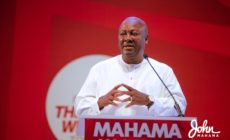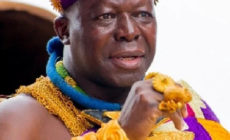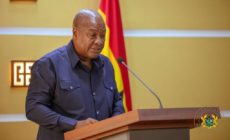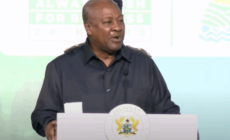Prez.Mahama fights Nana Addo over economy
- Posted on
- Comment
 PRESIDENT John Mahama has described the statement by Nana Addo Dankwa Akufo-Addo, flagbearer of the New Patriotic Party (NPP), that Ghana’s economy is in crisis as political propaganda.
PRESIDENT John Mahama has described the statement by Nana Addo Dankwa Akufo-Addo, flagbearer of the New Patriotic Party (NPP), that Ghana’s economy is in crisis as political propaganda.
Even though President Mahama, speaking on GBC Sunrise FM in Koforidua in the Eastern Region yesterday, conceded that the economy had recorded lower growth rate, he insisted that it did not mean the economy was in crisis.
He said it was only the opposition NPP that would claim that Ghana’s economy was in crisis for political propaganda.
Nana Akufo-Addo, during the launching of the party’s fundraising campaign on Wednesday, stated that Ghana, as it stands today, is a nation in crisis.
According to Nana Addo, the agriculture sector, which is the bedrock of the country’s economy, “is a pale shadow of its former self” while “manufacturing is at a very low ebb, with corruption at its peak.”
Apart from that, he said “our economy is in tatters, inflation is high, taxes are rising, businesses – both big and small – are struggling and millions of young men and women are without work,” adding that incompetence had become the hallmark of the Mahama-led National Democratic Congress (NDC) government.
“Ghana is in trouble. There is the need for a change in the way this country is governed, a change that will make way for a competent, honest, hardworking, well-qualified team to take over the affairs of this country and steer it in the direction of prosperity for all, instead of the current state of affairs which dwells on prosperity for the friends and family of the people in power,” the NPP leader stated.
Mr Mahama, who was unhappy about the criticism, said that his administration had managed to stabilise the economy and referred to the World Bank report that appeared on Wednesday, which named Ghana as one of the countries with very high expectations of growth and that the prospects of the Ghanaian economy were high.
Mr Mahama, who claimed that there was enough evidence to support his claim that the economy was doing well, stated that his administration had reduced the deficit-to-GDP ratio to below 7.2% from the 12% he plunged the country into in 2012 after the election spending.
However, the president did not touch on over-borrowing to pay for debts.
The government may end the year with a debt-to-GDP ratio of 74.1 percent, according to the new Fiscal Monitor report released by the IMF in Washington DC.
According to the report, Ghana will end 2016 with its debt-to-GDP ratio reaching 74.1 percent, a little higher than about 73 percent it recorded in 2015, making debt servicing problematic.
President Mahama, who believes he is doing a good job, said the economy is more resilient today than it was in the past. “It’s not an economy in crisis; absolutely not. If you see an economy in crisis you’d know that it is an economy in crisis,” he insisted.
Even though President Mahama inherited a growth rate of 14 percent in 2012, he had succeeded in driving it down to less than 3.5 because of poor management.
“The African average growth rate predicted by the World Bank and IMF is 3 percent and for Ghana they predict 3.3 percent. I’m more bullish. I believe that Ghana will grow closer to 4 percent—maybe between 3.8 and 4 percent,” he boasted.
FROM Daniel Bampoe, Koforidua










 (Selorm) |
(Selorm) |  (Nana Kwesi)
(Nana Kwesi)